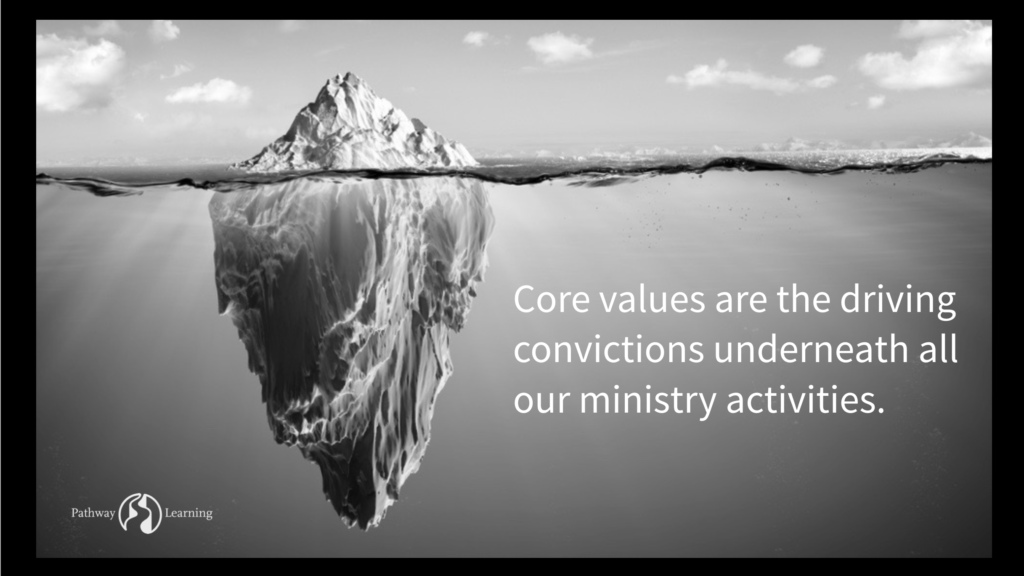Looking Underneath Our Behaviors to Our Values (Values, Part 3)
Series: Shaping Your Core Values (Part 3)
Author: Dr. Steven L. Childers
Title: Core Values Defined
Having looked at beliefs and having looked at behaviors, we're going to narrow in on the concept of values. Church planters often fail to understand the true underlying values of the church. Which as we'll see in this article, are often not the same as the churches stated articulated values.
Church values normally take a long time to be developed and truly owned, and an even longer time to change once they have been adopted. That's a hard lesson learned.
Another common mistake church planters make is to focus solely on developing external activities, or what we call behaviors, instead of also focusing on ministry value that empower and sustain the ministry activities. In other words, you can reward and punish people to try to get them to do certain things in your church, and they'll sometimes perform for a while. But it won't last long until they actually have this core worldview that fuels this belief that is actually manifests themselves in things that they deeply value and that's why they do what they do
You're not just telling them what to do, you're helping cultivate their heart to understand why they do it. You're helping them to value something and then it's just natural to let them go.
Core values are the underlying convictions that reflect the biblical purposes for the church and drive its ministry activities. I have tried to place here, in this definition, values, beliefs and behaviors. Core values are the underlying convictions. Those are the core values that reflect the biblical purposes or beliefs that drive its behaviors or ministry activities.
Every one of you have had certain ministries that have formed you, that have shaped you. Maybe have influenced you more than you're aware of. Or the flip side I find is also real common. That is, you have nightmares because you want others to have what you didn't have. Or to put it another way, you don't want others to experience what you experienced.
Even as you hear these words normally, there are images that come to your mind. There are these underlying convictions, there are these dreams of what you aspire this church to be and what you don't want it to be. That'd be the underlying convictions.
Biblical purposes, and make sure you put this together with the last module on purposes, core values must be shaped by the biblical purposes we looked at last time.
Worship and prayer
Learning and discipleship
Fellowship in groups
Evangelism/witnessing
Acts of mercy/social concern
This is one of the common mistakes that church planters make, and it's been very interesting in studying church planting literature, that it took about a decade or so for church planter trainers to look back on this concept of the importance of a self-conscious awareness of values that are driving the church planter and congregation.
Then all of a sudden recognizing, sometimes 10 years later, that those driving values, lets say 5 or 6 values that were driving them, 2 or 3 of the biblical purposes were there, but 2 or 3 of the biblical purposes were not shown in the values. It was only until about 10 years later when the church had it's health and vitality evaluated, that the church leaders looked back and said,
"we diagnosed our core values and we said we don't want there to ever be a ministry that we don't ask and can get a good answer to the question 'how does this ministry reflect our core values? Which core value is underneath this ministry?' And we've been guided by that and our church has been blessed by that, but only recently have we looked back and actually evaluated these core values and seen how there are 2 of the biblical purposes that aren't even represented in our 5 or 6 core values."
It used to be almost following the business model, helping entrepreneurs start new businesses, "What drives you? What excites you? Just pick out things in the air that are your core values, then put them down on paper, and if this excites you, it will excite the people you gather around you."
All of a sudden church planter trainers and church leaders began to recognize that we don't just pick out of the air the core values that we make central to everyone.
We let the biblical purposes inform those values.
So, we have a core value that reflects worship. We have a core value that reflects discipleship. We have a core value that reflects fellowship. We have a core value that reflects outreach. We have a core value that reflects acts of mercy.
Those core values might be extremely diverse from one church to another, but notice they're all driven by the biblical purposes. The way they flesh them out will often look dramatically different in terms of how worship ministry, or what aspect of worship ministry is valued.
You see some examples there of evangelism and missions values. Church multiplication, lets say this is a value. Extending the kingdom of God to all nations through starting and multiplying gospels in our churches. There's one of my core values. Even from the very beginning. Our church is actually planning on being a church planting church. The DNA is here. That's why we exist. That's one of the things that drives us to start this church. That's why we do what we do.
Then the last one, ministry activities. If people don't share values, they need to sustain a ministry activity, it will inevitably just wither. It will be a perfunctory, dutiful, manner and it will almost never thrive.


